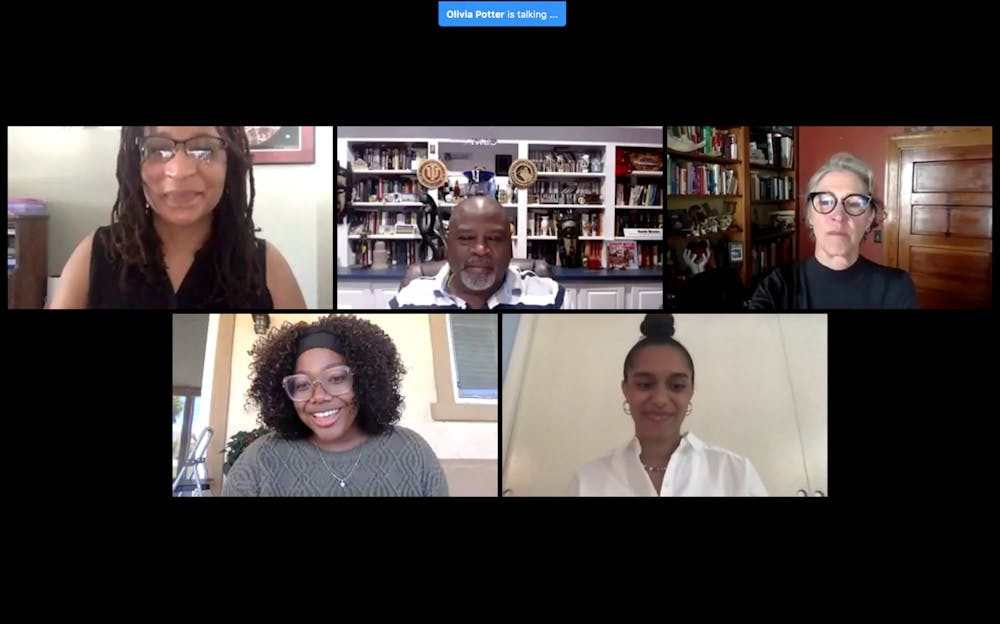IU Maurer School of Law students organized an online event Saturday to discuss ways to put their support for the Black Lives Matter movement into action.
The event featured Jada Bee of Black Lives Matter B-Town as the keynote speaker. Panelists included Jane Heneger, executive director of American Civil Liberties Union Indiana and Maurer alumna; Jacinda Townsend, a historical fiction novelist and Duke University School of Law alumna; and Kevin Brown, Richard S. Melvin professor of law at Maurer. After the panel, there was an online workout class led by Equinox Group fitness instructor Sean O’Donnell.
The event was also a fundraiser for BLM B-Town, Black Visions Collective and the Bail Project. Olivia Potter, president of the International Law Society at IU, said in an email that the group raised $3,371.03, over twice the amount of their $1,500 goal. Law firm Stoll Keenon Ogden said they will also contribute donations from their next Casual for a Cause day when employees donate money to dress casually.
Bee gave an activist’s perspective on defunding the police and unnecessary laws. The panelists discussed facing and seeing racism in their workplaces and schools and their approaches to fighting it from a legal and human perspective.
Bee said some people believe the police who kill or harm people without reason are “just a few bad apples.” She disagrees.
“The reality is that we only have a handful of relatively OK apples in orchards and orchards of rotten fruit, stemming from bad, poisonous trees that were planted years and years ago,” Bee said.
She referenced an op-ed written by Amrita Chakrabarti Myers, IU professor of history and gender studies, in the Courier Journal about how law enforcement rose out of the slave patrol, white men whose jobs were to catch slaves who were out at night, something that was seen as dangerous.
“Our current system of laws and our law enforcers are reproducing the sins of the past,” Bee said. “Why are young black men shot while running away from police? It is about not obeying.”
The panelists moved the discussion to racism in other institutions, especially in the legal system.
Brown, who is one of very few Black male professor at Maurer, said the problem is in the way discrimination law is interpreted. He said the Supreme Court has not acknowledged the disadvantages Black people face.
“The legal system itself becomes a conceptual block in trying to institute policies and programs that will deal with these racial disparities everywhere,” Brown said. “To take into account the fact that Black people are facing a different cultural environment than whites is in and of itself described as discrimination, given the way we have interpreted the equal protection clause.”
Heneger, who is white, said as long as our society is racist, our legal system will be racist. She said lawyers like to pride themselves on knowing and living by the rules, but following the rules don’t necessarily correspond to moral high ground.
“We think we’re holding ourselves to a higher standard when that standard is embedded in racism,” she said.
She talked about the racism present within the nonprofit, social justice world she works in. Much like lawyers whose association with law may make them believe they are immune to racism, people who work in social justice tend to think they could never be racist.
“Having the best intentions within a poisonous, tainted system isn’t enough, isn’t meaningful unless you are willing to own and hear how you are failing,” she said.
Townsend, who is Black, was a broadcast journalist for a time and said people in her predominantly white newsroom would cut Black people’s sound bites so much that they were manipulated to have a whole other meaning. She said she did not have much power in the newsroom at the time and didn't want her career ruined, so she remained silent, but she wished she would have spoken up.
“We’re all gatekeepers, whether you’re a beginning attorney or an unpaid intern, you’re still a gatekeeper, and it’s really important if we want to further civil rights in the country, if we want to further Black lives, to remember that every single day, you are keeping a gate,” she said.
Although anyone could come to the online event, Brown addressed law students specifically when talking about how to discuss racism with peers. He said many law students will become powerful decision makers one day in a variety of fields.
“If you’re not having these conversations with your conservative colleagues, your conservative colleagues are going to walk away from here, they’re going to prosecute Black people, they’re going to send Black people to jail, they’re going to vote against legislation,” he said. “If you want to be part of the civil rights movement, the movement for equality, start where you are.”




